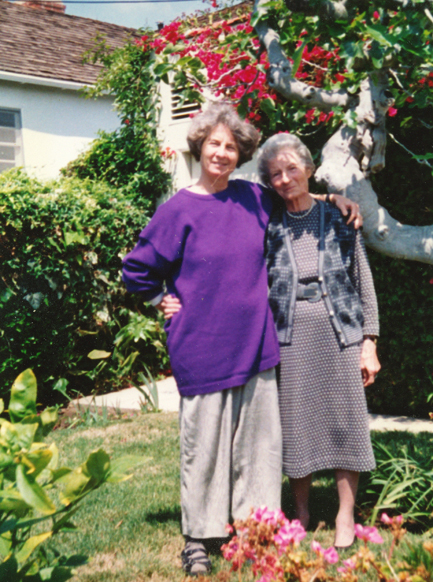SIMONE FORTI
MOTHER AND TOKYO
— I was scheduled to go to a dance festival in Japan. Mother seemed on the verge of dying but there had already been some false alarms. Years earlier, on my way to that same festival, I had gotten sick and had canceled at the last minute. I didn’t want to do it again.
Before leaving Los Angeles, standing at Mother’s bedside I told her, “I’m going away for a few days. I’m going to Paris.” I said Paris because I often worked there and she had once lived in Paris and could envision it. In fact when she heard “Paris,” she broke into a smile. Briefly. But mainly that look of blankness, some recognition that I was going away, her voice low, just raspy sound. Eyes imploring to connect.
I arrive Tokyo. Humid, hot, big wind. Many buses with big writing, yellow and white on black and red rising sun. Loudspeakers blaring, almost bring-fingers-into-ears loudness.
At hotel desk:
I ask: “What are they saying?”
Young woman: “Black cars? Election coming.”
Me: “Oh. Vote this one.”
“Yes.”
From my seventh-floor window I see treetops wild moving. Imagine steamy hotness whipping fragrance from the leaves. My room hermetic and gently air-conditioned, I placed phone calls. “Yes, I’m trying to call from Tokyo to Los Angeles. Your system isn’t accepting my account number.” And finally, “Hello Mommy! Hello Mommy! Hello Mommy!”
Then going out to change money, stopping again by front desk.
I say: “I see park from window. Where is park?”
She looks questioning.
Me: “Trees. Many trees. Park.”
“Oh.”
She pulls out map.
“Hotel here. Park here. But typhoon coming.”
In street some rain, big wind but all have open umbrellas. Department store, fourth-floor exchange booth, fifty dollars for five hundred eighty yen. Coming out again I feel the power of the wind; a little afraid, I move fast. Some still have umbrellas open.
Back in hotel, at front desk to get room key.
Young woman: “Not elections. Memorial Day. Those people support emperor. Today is anniversary Nagasaki. The black cars saying ‘Remember.’”
Me: “Oh. Thank you.”
Young woman: “I don’t want you have wrong information.”
“Oh, thank you. I appreciate.”
We linger, full of wanting to tell more, to hear more. She is young, sweet and clear behind desk. Thoughts bouncing around in both our minds as in a few seconds we micro-signal: “…there’s more to say, no, yes, no…” slight bows shared, “Thank you.” Again, “Thank you.” I go to elevator, my eyes leaving hers a little too quickly. Memorial Nagasaki.
Again wild moving trees seen from above. Waves of biomass crashing, running light and shadow. Finally I go down to the park. Working umbrella like kite, now with soaked shoes and pants legs. Through the locked gate I see the park’s dark floor. Take in its stillness. Breathe rich typhoon breath. A crow stands there, quiet. Earlier, a crow-call urgent, loud, and some hollow reedy sounds, first just hearing sound, then realizing it’s a call.
Mother loved languages and she gave me that love. I love to try, from one language to another, a word that is similar in French and Spanish and Italian, but in English different. Like “pioggia,” “lluvia,” “il pleut.” And then, “Rain.” “Speak” is sharp. “Parola,” “parlare,” “parlance” rolls from the tongue. “Tongue” taps at the root of the teeth and finishes back in the root of itself. “Tongue.” “Teeth” is very to the teeth. In Mother’s earlier old age she would slip from language to language to language and I would slip around with her. When she was still walking we sometimes would go to the Japanese Pavilion at the Los Angeles County Museum and walk down the spiral ramp looking at the prints, or the calligraphy. Ink that strokes the subject, and can, for a moment, change your breathing.
When I got back to Los Angeles and entered her room, Mother dug her face toward the pillow, looking away. Then I read to her in English, brief poems by Japanese women, soft and rhythmic, for her to have the activity of sound-listening, activity being so scarce in her last days. We fall silent, a peaceful moment, the brittle edge gone, we linger. I resume reading, Mother long beyond following meaning but sensing the meaning of being read to. And the grace of the sound.
—
Simone Forti is a dancer, choreographer and writer. Based in Los Angeles, she directs the ensemble, Sleeves, with whom she has just performed CONVERSATION PIECE at Highways Performance Space. She is interested in conversation as an important element of civic life and in the juxtaposition of, or space between, different people’s different ways of doing and seeing.
